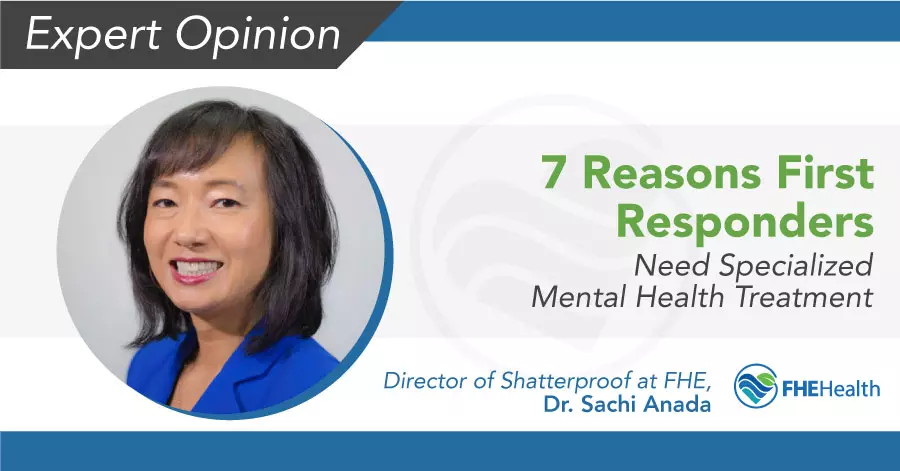
This article has been reviewed for accuracy by our peer review team which includes clinicians and medical professionals. Learn more about our peer review process.
Updated October 16, 2022
For first responders, work-related stress is an ongoing concern. Experiences associated with acute stress as well as chronic stress can play a role in the development of mental health conditions like anxiety and post-traumatic stress disorder (PTSD). Since first responders typically experience or witness issues associated with loss, injury, and death, they are at an increased risk to develop symptoms of mental illness; yet the stigma associated with mental health conditions often prevents first responders from seeking professional care, including therapy.
What are the Statistics on First Responders and Mental Health?
As context for a discussion about the importance of specialized treatment for first responders who may have mental health needs, it may be useful to consider what the statistics say. For example, it is not uncommon for mental health and substance abuse issues to co-occur in this population. As illustration, here are some quick statistics about firefighters, EMTs, and police officers...
Treatment can begin quickly and discreetly, get started now Instead of seeking support or therapy, some first responders have turned to alcohol or drugs to self-medicate away their mental health symptoms. Consider these stats on firefighters, for example: Firefighters aren’t the only first responders who face elevated risks for mental health conditions and substance abuse. SAMHSA has reported that 36 percent of EMTs are suffering from depression and more than 20 percent are coping with PTSD. One of the problems that exacerbate mental health disturbances for EMTs is that they don’t get adequate time to heal between traumatic events. Instead, they face stress after stress, leaving them more vulnerable to substance abuse. The National Institute on Alcohol Abuse and Alcoholism reports that police officers are at increased risk of alcohol abuse, which may not be surprising given their frequent contact with stressful situations, including domestic violence, murder, suicide, and so forth. Nearly 50 percent of police officers are battling depression and anxiety. The longer the officers are on the job, the more vulnerable they are to the development of a mental health condition. Coping with a mental illness takes time and professional treatment. Unfortunately, many of the first responders who are at the greatest risk of addiction are the least likely to seek help. Already feeling anxious or depressed, they may feel less inclined to report their symptoms even to their doctor. Turning to drugs or alcohol may quell symptoms of depression or anxiety temporarily, but this practice paves the path to abuse and addiction, which only heightens the problem. Treatment can begin quickly and discretely, get started now Therefore, it’s not uncommon to find that first responders have a dual diagnosis, the presence of both a mental illness and substance addiction. The best way to treat dual diagnosis is with simultaneous treatments. Of course, treatment that is tailored to the specific needs of first responders is ideal, because it addresses the stressors unique to their job. By learning how to cope with their work-related stress in healthy ways, they can begin the process of healing and managing their condition for the long term. Whether they’re police officers responding to a distress call, firefighters saving families from the flames, or soldiers defending our national security in hostile territory, America’s first responders are always on the frontlines of crises, dangers and disasters. That high level of job-related stress and trauma can take a heavy toll on anyone’s mental and behavioral health. Among first responders, though, the higher rates of PTSD, substance abuse and suicide are compounded by a strong sense of vocational duty to put others’ health and welfare before their own. This spirit of altruism, while noble, can also be an obstacle to getting much-needed treatment for addiction and other mental health conditions. Dr. Sachi Ananda is intimately familiar with these distinctive experiences, concerns and mental health needs among first responders— all of which are reasons they need specialized treatment. As the director of Shatterproof FHE Health program, a specialized treatment program for first responders seeking support, Dr. Ananda has been working with this population for years, and has expertise in the issues that commonly affect emergency responders. Her areas of treatment specialization are: therapies for trauma, relationships and drug and “process” addictions (such as gambling and sex and love). On that note, what follows is a more detailed look at the reasons first responders need specialized mental health treatment…. To be sure, rates of post-traumatic stress disorder (PTSD) and suicide are higher among first responders. For example, a study by the Ruderman Family Foundation in Newton, Massachusetts, reportedly found that policemen and firefighters are more likely to die by suicide than in the line of duty. They are also 20 percent more likely to die by suicide than the general population, the same study concluded. As for rates of PTSD? These are also significantly higher among first responders, on account of their higher—in some cases daily—frequency of exposure to trauma. When Syracuse University researchers studied the impact of post-traumatic stress on first responders in December 2015, they found that the rate of PTSD in first responders may be more than 30 percent, according to some research. They also noted that experts believe this figure to be “under-reported because first responders discourage complaints of psychological distress.” Ready to start? More questions about treatment? The high prevalence of trauma and PTSD among first responders means they need therapies that quickly and effectively target and treat these issues. This is especially key because first responders want to get back to serving their communities as soon as possible. The following therapies for first responders are superior to other non-trauma-based therapies when treating the first responder population: She observed that “because first responders are on the ground working every day with people in need, they tend to be more concrete in their thinking.” With the help of state-of-the-art, brain imaging technology that FHE Health employs in its Neuro Rehab program, patients in Shatterproof FHE Health are able to literally see the impact of PTSD and hypervigilance on their brain. “This helps to take away the guilt and shame they may carry that they have mental health problems due to some faults of their own,” Dr. Ananda said, noting that “by the end of their treatment, first responders learn how much their brain has healed through the program.” “Due to chronic exposure to stress, evening/24-hour shift work, and lack of mental health support from departments, [first responder] families also don’t get support they need,” Dr. Ananda added. First responders suffer from addiction to drugs and/or alcohol at disproportionately high rates as well. (Often substance abuse begins as an effort to cope with symptoms of PTSD— especially when there’s enormous internal and external pressure to minimize symptoms of PTSD and/or another mental health condition like depression or anxiety.) Consider these statistics from the Substance Abuse and Mental Health Services Administration (SAMHSA) regarding firefighters and substance abuse: “Denial, not believing that they are engaging in self-destructive behaviors that they cannot control,” is another big obstacle. So is shame: “they wanted to be a first responder to help people, and to accept that their unhealthy behaviors may have hurt others or their loved ones is very shameful.” Fear is a big obstacle to treatment that first responders uniquely face in the following ways, according to Dr. Ananda: The above barriers to accessing care can also manifest themselves during the treatment process itself, impeding a patient’s progress in treatment and compromising their treatment outcomes. For this reason, the best, most effective form of behavioral healthcare is a specialized treatment track that allows first responders to work on their individualized treatment needs within a supportive peer community of other first responders. Here is how Dr. Ananda explained the healing power of this peer community: “Due to first responders’ daily exposure to the harsh realities of life, they have to build a shield that helps protects them from mental, physical and emotional harm. This shield may be maintained by developing a hypersensitive reaction to trusting others. Unfortunately, for some first responders, this shield doesn’t come down easily off the job, which keeps them disconnected from their friends, families and loved ones. When first responders come to treatment, their shield comes down faster when they know that they will be among other first responders who have experienced similar challenges. This instant sense of trust allows them to begin the healing process on a quicker and deeper level.” Addiction and mental health disorders can happen to anyone. Remember that asking for help for a mental health problem is never a sign of weakness: It is, rather, an act of courage that will help you, your family, your department, and your community. As Dr. Ananda put it, “Sometimes rescuers need rescuing too.” Learn more about our Shatterproof FHE Health program. Kristina Robb-Dover is a content manager and writer with extensive editing and writing experience... read moreNeed Help?
Firefighters
EMTs
Police Officers
Start Treatment Now
How Common are Dual Diagnoses?
 In a recent interview, Dr. Ananda shared her insights into what makes first responder mental health treatment so unique. Her remarks help to explain why FHE Health Founder Sherief Moustafa, “a public servant by way of nursing,” originally founded the Shatterproof FHE Health program: “as an extension of the focus of FHE Health serving as a resource for public needs,” and, “to address the growing need to help first responders with addiction, PTSD and depression mental health issues,” in Dr. Ananda’s words.
In a recent interview, Dr. Ananda shared her insights into what makes first responder mental health treatment so unique. Her remarks help to explain why FHE Health Founder Sherief Moustafa, “a public servant by way of nursing,” originally founded the Shatterproof FHE Health program: “as an extension of the focus of FHE Health serving as a resource for public needs,” and, “to address the growing need to help first responders with addiction, PTSD and depression mental health issues,” in Dr. Ananda’s words.What are the Reasons First Responders Need Therapy?
Reason #1: First Responder PTSD and Suicide
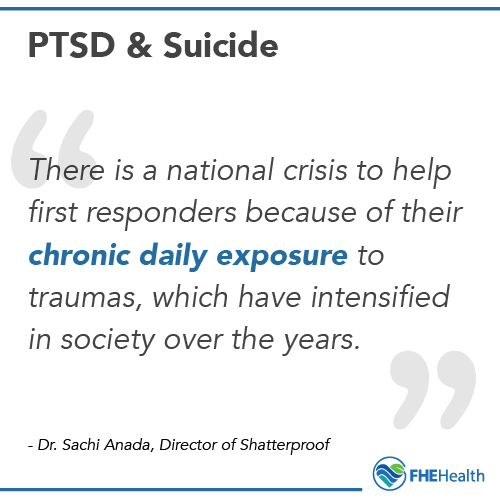 First responder PTSD and suicide are the most urgent mental health concerns that need addressing. Dr. Ananda was quick to note that “there is an alarming rate of suicide by first responders, and sadly there are few targeted mental health programs that address their specific needs.” In addition, “there is a national crisis to help first responders because of their chronic daily exposure to traumas, which have intensified in society over the years.”
First responder PTSD and suicide are the most urgent mental health concerns that need addressing. Dr. Ananda was quick to note that “there is an alarming rate of suicide by first responders, and sadly there are few targeted mental health programs that address their specific needs.” In addition, “there is a national crisis to help first responders because of their chronic daily exposure to traumas, which have intensified in society over the years.”Begin your recovery today
Reason #2: Specialized Trauma-Based Therapies Work Better
Reason #3: Neuro Rehab Services That Restore Brain Health
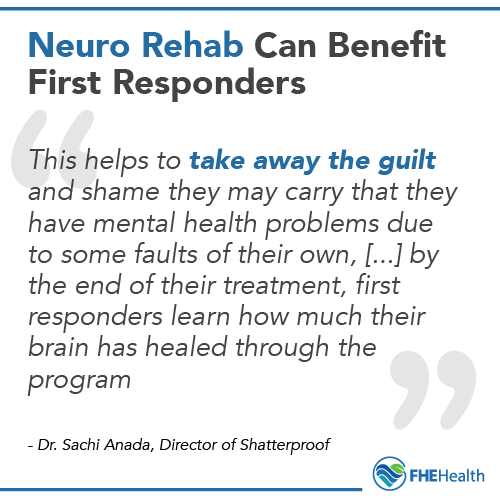 When these trauma-based therapies are paired with neuro therapies that restore brain function, Shatterproof FHE Health patients achieve an even faster recovery, which enables them to “get back to serving their communities as quickly as possible, while also ensuring they are 100 percent ready for active duty,” Dr. Ananda said.
When these trauma-based therapies are paired with neuro therapies that restore brain function, Shatterproof FHE Health patients achieve an even faster recovery, which enables them to “get back to serving their communities as quickly as possible, while also ensuring they are 100 percent ready for active duty,” Dr. Ananda said.Reason #4: Other Mental Health Issues Among First Responders
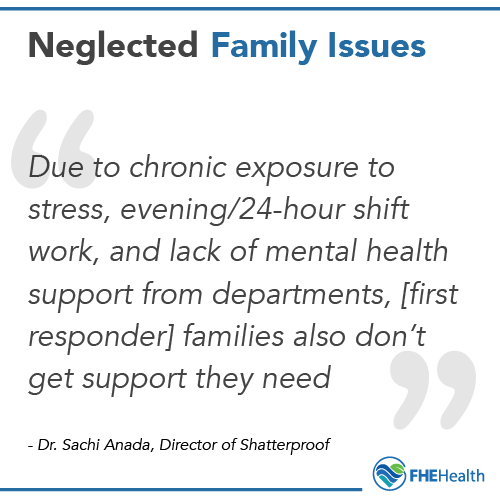 Such statistics don’t surprise Dr. Ananda. Based on her more anecdotal experience working with patients in Shatterproof FHE Health, she said the most common presenting issues and mental health conditions that she sees among patients in Shatterproof FHE Health are “PTSD, depression, anxiety, mood disorders, insomnia, suicidal thoughts/attempts, and substance dependence,” followed by “gambling, food, and sex addictions.”
Such statistics don’t surprise Dr. Ananda. Based on her more anecdotal experience working with patients in Shatterproof FHE Health, she said the most common presenting issues and mental health conditions that she sees among patients in Shatterproof FHE Health are “PTSD, depression, anxiety, mood disorders, insomnia, suicidal thoughts/attempts, and substance dependence,” followed by “gambling, food, and sex addictions.”Reason #5: Addiction and Emergency Responders
Reason #6: Unique Obstacles to Treatment That First Responders Face
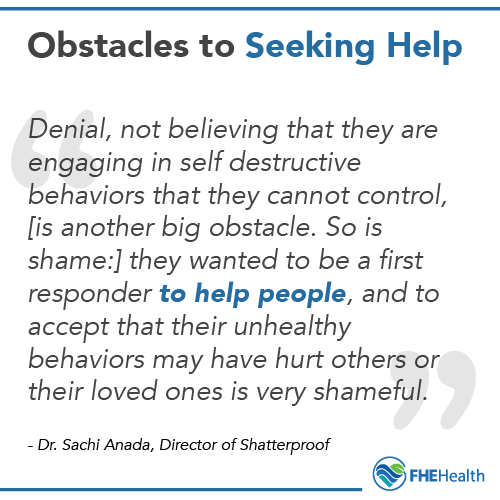 First responders face certain obstacles to treatment that are unique to their jobs, according to Dr. Ananda. She said many first responders find it difficult to be away from their department, because “departments often work like families for first responders … First responders feel guilty leaving their team to get help.”
First responders face certain obstacles to treatment that are unique to their jobs, according to Dr. Ananda. She said many first responders find it difficult to be away from their department, because “departments often work like families for first responders … First responders feel guilty leaving their team to get help.”
Reason #7: How Specialized Treatment Can Overcome These Barriers
Do You Need Addiction Help and Mental Health Treatment?
![]()
About Kristina Robb-Dover
Footer






